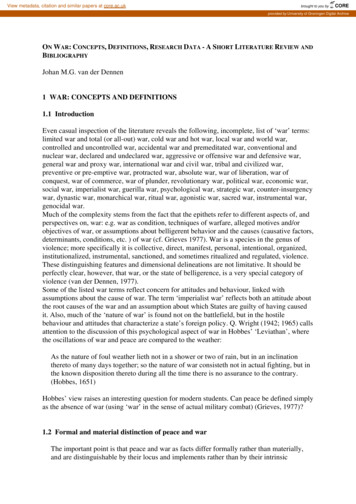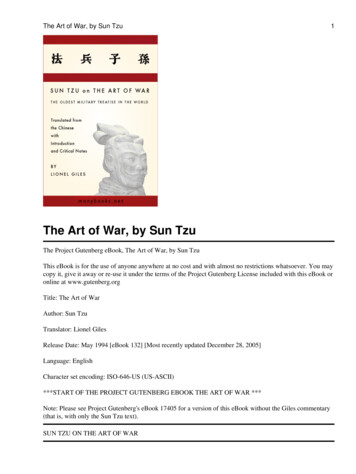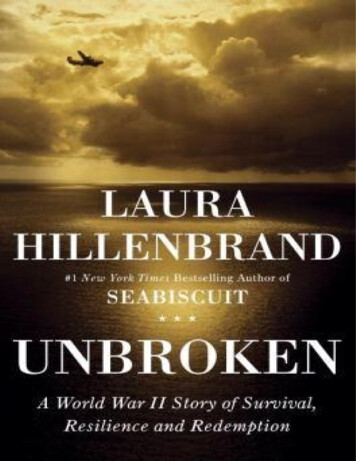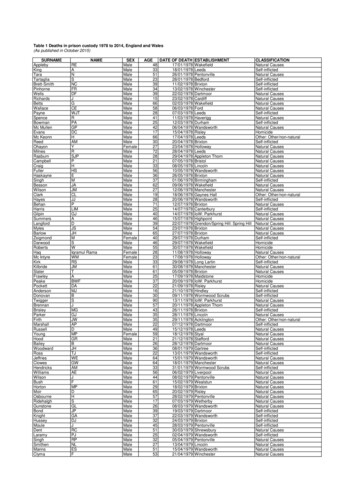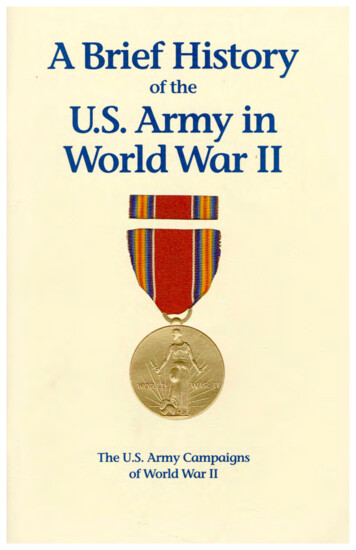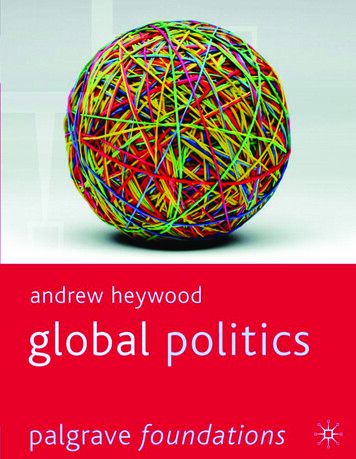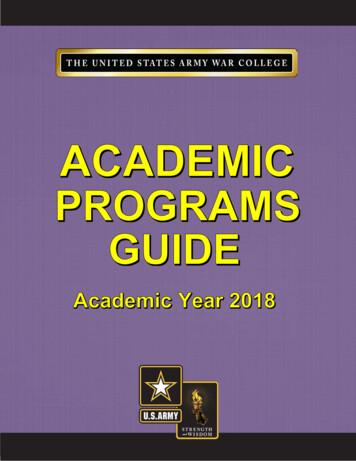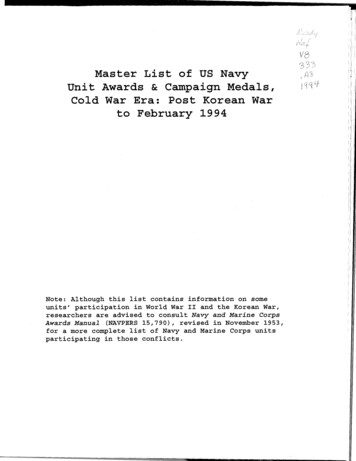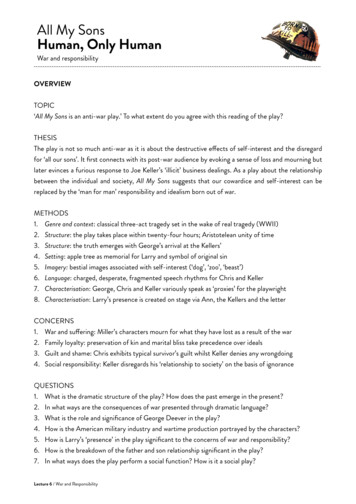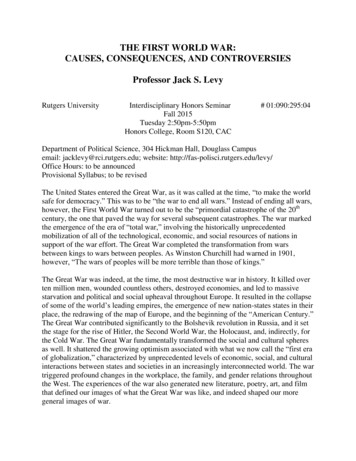
Transcription
THE FIRST WORLD WAR:CAUSES, CONSEQUENCES, AND CONTROVERSIESProfessor Jack S. LevyRutgers UniversityInterdisciplinary Honors SeminarFall 2015Tuesday 2:50pm-5:50pmHonors College, Room S120, CAC# 01:090:295:04Department of Political Science, 304 Hickman Hall, Douglass Campusemail: jacklevy@rci.rutgers.edu; website: http://fas-polisci.rutgers.edu/levy/Office Hours: to be announcedProvisional Syllabus; to be revisedThe United States entered the Great War, as it was called at the time, “to make the worldsafe for democracy.” This was to be “the war to end all wars.” Instead of ending all wars,however, the First World War turned out to be the “primordial catastrophe of the 20thcentury, the one that paved the way for several subsequent catastrophes. The war markedthe emergence of the era of “total war,” involving the historically unprecedentedmobilization of all of the technological, economic, and social resources of nations insupport of the war effort. The Great War completed the transformation from warsbetween kings to wars between peoples. As Winston Churchill had warned in 1901,however, “The wars of peoples will be more terrible than those of kings.”The Great War was indeed, at the time, the most destructive war in history. It killed overten million men, wounded countless others, destroyed economies, and led to massivestarvation and political and social upheaval throughout Europe. It resulted in the collapseof some of the world’s leading empires, the emergence of new nation-states states in theirplace, the redrawing of the map of Europe, and the beginning of the “American Century.”The Great War contributed significantly to the Bolshevik revolution in Russia, and it setthe stage for the rise of Hitler, the Second World War, the Holocaust, and, indirectly, forthe Cold War. The Great War fundamentally transformed the social and cultural spheresas well. It shattered the growing optimism associated with what we now call the “first eraof globalization,” characterized by unprecedented levels of economic, social, and culturalinteractions between states and societies in an increasingly interconnected world. The wartriggered profound changes in the workplace, the family, and gender relations throughoutthe West. The experiences of the war also generated new literature, poetry, art, and filmthat defined our images of what the Great War was like, and indeed shaped our moregeneral images of war.
2Few were spared the war’s destruction and other negative consequences, and fewemerged better off after the war than they were before. This naturally leads to thequestion of “how did it happen?” A hundred years later, we have no conclusive answerbut a great deal of debate. 2014 marked not only the centennial of the Great War but alsothe end of the first hundred years’ debate regarding the war’s origins (causes). As onehistorian commented, more has been written about the First World War than about anysecular event in the history of the world. Undoubtedly one reason for the absence ofscholarly consensus on the origins of the war is its complexity. As the historianChristopher Clark argues, the First World War is “the most complex event of moderntimes.” Another reason for the absence of consensus is that the scholarly debate aboutwhat caused the war has been politicized, entangled in the last hundred years ofinternational politics and conceptions of national identity.The year 2014 witnessed countless commemorations of the centennial of the Great Warthroughout Europe, along with a tidal wave of new books, articles, and journalism aboutthe causes, consequences, and legacy of the war. Within two years there will be someform of remembrance in the United States, marking the centennial of the Americanexperience of the Great War. For these reasons and more, this is a good time for anintense examination of the Great War, a fundamentally transformative event that in manyrespects marked the birth of the modern age.FOCUS OF THE COURSEThis seminar will cover many diverse aspects of the Great War. It will provide a broadunderstanding of the causes of the war, the conduct of war on the battlefield, the socialand economic mobilization for war at home, the political and economic and socialconsequences of the war, its broader cultural impact, and the ongoing legacy of the war.We will complement this breadth of focus with a more detailed examination of particulartopics. Given the diverse backgrounds, interests, and disciplinary orientations of studentsin the seminar, I will allow students to select these topics for investigation, as those topicswill define their research papers for and oral presentations to the seminar. Students canchoose to examine the role of a particular state in the outbreak or expansion of the war; aparticular analytic cause of war, such as private economic interests or militarism; themanagement of war economies; the social mobilization for war on the home front;pacifist movements; wartime atrocities and other violations of the law of war; medicalinnovations or nursing associated with the war; the nature of military strategy; the impactof war on the workplace or on gender relations; the nature of poetry, art, music, orfilmmaking during the war; American intervention in the war; the treaties ending the war;or other topics. I will say more about possible research topics, and offer suggestions, laterin the syllabus and in class. Students having a difficult time coming up with a topic willbe encouraged to look at something relating to the causes of the war. This is amanageable topic that has worked out well in my other classes.
3By spending a fair amount of time on a particular research paper, each student willcomplement his/her breadth of understanding of the many faces of the war with moredetailed knowledge about a particular topic. Collectively, that will generate about fifteentopics that we study in depth. More importantly, however, students will develop research,writing, and speaking skills. Learning how to define a research topic, gather and organizeresearch materials, write a research paper, present one’s argument and evidence to agroup, and field questions about a paper is one of the most important things one can learnin college. This Interdisciplinary Honors Seminar is a good place to start, or perhaps tocontinue, developing those skills.PEDAGOGICAL OBJECTIVESThe seminar has several primary aims. One is to gain a general understanding of the FirstWorld War and its causes, consequences, social and cultural impact, and continuinglegacy. A second is to use the First World War as a vehicle to better understand war ingeneral. The Great War was unique in many respects, but it is still useful as an exemplarto understand broader phenomena, including the causes of war, globalization, theinterconnections between war and society, and historical memory, among other themes.In fact, general theories of war in the field of International Relations in Political Sciencehave been disproportionately influenced by the experience of the Great War. A third aim,especially for students analyzing the causes or termination of the war but probably formany others as well, is to learn to make causal arguments, and to appreciate the kinds ofhistorical evidence appropriate for confirming or disconfirming different theoretical orinterpretative arguments. Related to the causality theme is the need to understanddifferent kinds of causality (necessary and sufficient conditions, for example), and therole of the comparative method and of counterfactuals in empirically validating causalarguments. A final aim of the course – and in some respects most important of all – is tohelp students develop research skills: to plan and organize a research paper, write apolished paper, present a paper to a critical audience, and learn from feedback from theaudience and from the professor. These goals and means of advancing them fit nicely intothe “Writing in the Disciplines” theme of the Core Curriculum at Rutgers.
4READINGBooksThe required reading for the course includes four books, the last three of which areavailable for purchase. In the approximate order that we read them, they areJohn Horne, A Companion to World War I. Chichester, UK: Wiley-Blackwell, 2010.Jay Winter and Antoine Prost, The Great War in History: Debates and Controversies,1914 to the Present. Cambridge, UK: Cambridge University Press, 2005.Christopher Clark, The Sleepwalkers: How Europe Went to War in 1914. New York:Harper Perennial, 2013.Sean McMeekin, July 1914: Countdown to War. New York: Basic Books, 2014.All but the first of these books is available for purchase (or maybe for rental) at RutgersBarnes & Noble Bookstore (100 Somerset Street, 732 246 8448) and possibly at NewJersey Books (37 Easton Avenue; 732 253 7666). These books are also available, perhapsat reduced prices or in a Kindle edition, on the internet. I asked Alexander Library toplace on copy of each on Undergraduate Reserves. The first book, John Horne’s ACompanion to World War I, is available as an e-book in the Rutgers Libraries system(which is fortunate, given its expense).Articles and Book ChaptersThe required reading for the course also includes a fair number of articles and bookchapters. As you will see, many of these readings are fairly short excerpts, so please donot be deterred by the long list. All of these articles and chapters (but not the requiredbooks, and not selections from the Horne Companion volume) are available on my Sakaisite, www.sakai.rutgers.edu. Many of you may be familiar with Sakai. If not, go to thesite and then log in by entering your Rutgers ID and password. There should be a tab atthe top for “First World War.” Click that, and then go to “Resources” in the menu to theleft. Folders 1-14 include all the reading for each week of the term (except for requiredbooks and for chapters from the Horne book). If you have trouble getting this far you cancall the help desk at Sakai, 848.445.8721. The people there are quite helpful.The list of articles included under “Resources” on my Sakai site, in alphabetical order, is“100 years after 1914: Still in the grip of the Great War,” Economist, 29 March 2014.Bass, Herbert J. “Introduction.” In Bass, ed., American Entry into World War I:Submarines, Sentiment, or Security? New York: Holt, Rinehart, and Winston, 1964. Pp.1-7.
5Boyd, William. “Why World War I Resonates.” New York Times, January 21, 2012,Sunday Review, p.8.Bridge, F.R., and Roger Bullen. The Great Powers and the European State System, 18151914. London: Longman, 1980. Chap. 5-8.DeGroot, Gerard. “World War I's lasting bootprint.” Christain Science Monitor, May 25,2014. -I-s-lastingbootprint?cmpid TWDehio, Ludwig. The Precarious Balance: Four Centuries of the European PowerStruggle. Trans. Charles Fullman. New York: Vintage, 1962. Pp. 224-46.Emmerson, Charles. “Why 2013 eerily looks like the world of 1913, on the cusp of theGreat War.” Foreign Policy, January 4, 2013.Joll, James. “The July crisis 1914.” In Joll, The Origins of the First World War. NewYork: Longman, 1984. Chap. 2Levy, Jack S. “Theories of Interstate and Intrastate War: A Levels-of-AnalysisApproach.” In Chester A. Crocker, Fen Osler Hampson, and Pamela Aall, eds., TurbulentPeace: The Challenges of Managing International Conflict. Washington: United StatesInstitute of Peace Press, 2001. Pp. 3-27.MacGillis, Alec. “Germany Looks at Russia and Ukraine and Sees 1914,” The NewRepublic, March 13, 2014. Millan, Maragret. “Was World War I Inevitable? Keynote Presentation, CarnegieCouncil Centennial, Sarajevo Symposium, 27 June 2014.Martel, Gordon. “Making Sense of the Madness.” In Martel, The Month that Changed theWorld, July 1914. Oxford, UK: Oxford University Press, 2014. Pp. 401-31.Morrow, John H., Jr., “The imperial framework.” In Jay Winter, ed., The CambridgeHistory of the First World War, vol. I: The Global War. Cambridge, UK: CambridgeUniversity Press, 2014. Chap. 15.Niiler, Eric. “What If World War I Never Happened?” Discovery.com, June 25, 914-1406251.htm
6Otte, T.G. “Conclusion.” In Otte, July Crisis: The World’s Descent into War, Summer1914. Cambridge, UK: Cambridge University Press, 2014. Pp. 505-24.Stevenson, David. “Conclusion: The War becomes History.” In Stevenson, Cataclysm:The First World War as Political Tragedy. New York: Basic Books, 2004. Chap. 21.“World War One: 10 Interpretations of Who Started WWI.” BBC News Magazine,February 11, 2014. http://www.bbc.com/news/magazine-26048324We will also be reading the following chapters in John Horne, A Companion to WorldWar I:0. John Horne, “Introduction”1. Gerd Krumeich, “The War Imagined: 1890-1914”2. John F.V. Keiger, “The War Explained: 1914 to the Present”4. Holger H. Herwig, “War in the West, 1914-16”5. Dennis Showalter, “War in the East and Balkans, 1914-1918”9. Robin Prior and Trevor Wilson, “War in the West, 1917-18”10. Paul G. Halpern, “The War at Sea”14. Jean-Jacques Becker, “War Aims and Neutrality”12. Stéphane Audoin-Rouzeau, “Combat”13. Alan Kramer, “Combattants: Atrocities, Massacres, and War Crimes”17 Jay Winter, “Demography”18 Susan R. Grayzel, “Women and Men19 John Horne, “Public Opinion and Politics”34 Jennifer D. Keene, “The United States”38 Laurence Van Ypersele, “Mourning and Memory, 1919-45”COURSE REQUIREMENTSThe most basic requirement for the class is to do all of the required reading in advance ofour weekly meetings, and to come to class prepared to discuss the reading and to use it toengage in the wide-ranging discussions in class. I have not scheduled examinations orquizzes to formally test students’ comprehension of the reading, but will instead evaluatethat comprehension based on student’s contributions to our weekly discussions – in termsof both the quantity and quality of those contributions. Thus your active participation inclass discussions is important. It is a central part of the learning experience; it is a skillthat will serve you well in the future; it counts for a significant fraction of your grade(20%, plus another 20% for your oral presentation); and it makes the class a lot more fun– for you and for the seminar as a whole.The more formal requirements for the class include a short statement of your researchtopic, a preliminary paper related to that topic, oral presentation of your argument andevidence in front of the class, and a final research paper. I describe each of these below,
7but let me begin with the basics. All page lengths listed below are for single-space pages(with an extra space between paragraphs; one easy way to do this, in Microsoft Word, isto set the “after” spacing to 6).1) Statement of topic for research paper. Due October 5 (anytime), at the latest. Email tome directly.2) Paper #1. Preliminary paper. Length: 2-3 pages, including a preliminary bibliographyof at least ten sources. Due October 26 (anytime). Submit on Sakai, assignments tab.3) Paper #2. Research paper. Due Friday December 18, noon. The length might varydepending on the project, but most papers should fall in the 10 -14 page range. Submit onSakai, assignments tab.There is no mid-term or final examination.Grading SystemYour final grade for the course will be calculated as follows:statement of research paper topicpaper #1oral presentationcontributions to class discussionsresearch paper0%15%20%20%45%due dateOctober 5October 30December 18 (noon)Students should email their paper topic (#1 above) to me, but they should submit theirpreliminary paper (#2) and research paper (#3) under the “Assignments” tab on Sakai.Papers should be in a Microsoft Word or PDF format. Please do not submit your papersin an .odt or other format; Sakai will not accept them. For those who prefer to work withother word processing programs, please convert your papers to a Word or PDF formatbefore you submit it. If you are not sure how to do that, I am sure someone at universitycomputing services can help. Please note that Sakai automatically runs papers through the“Turnitin” program. That program identifies passages in a paper that match passages inthe “Turnitin” data base, which includes previous student papers and internet sources. Seethe paragraph on academic integrity below.Note that the due date for the final paper is basically determined by Rutgers final examschedule. Instead of making the due date for the paper the day our final exam would havebeen scheduled, Dec 17, I am giving you an extra day. There is no final exam.
8RESEARCH PAPERAs I indicated above (p. 2), you are free to choose from a wide variety of topics for yourresearch paper for the seminar, though you must secure my approval. Because you will bespending a lot of time on the paper, and because the combination of your oralpresentation and research paper counts for a substantial proportion of your grade (65%),it is important that you choose a topic that interests you. I will begin by outlining what apaper relating to the origins (causes) or expansion of the Great War might look like. Inmany respects, a paper like this will be the easiest paper for many of you to write (whichis not to say it will be easy). It also includes a preliminary paper that is fairly easy todescribe, as I do so below. I will be able to give you the greatest guidance on this kind ofpaper; and if we have many people working on such topics, it will facilitate a livelydebate in the seminar on the origins of the war. I recognize, however, that their diverseinterests and disciplinary orientations will lead many students in the class to be moreattracted to other topics. I return to those in the next section.Papers on the Outbreak or Expansion of the First World WarYou are free to tackle the question of the overall causes of the war. Given the complexityof the Great War, however, I fear that you would quickly become overwhelmed by theamount of information available, unless you are already familiar with the history andunless you have previously taken a course on the causes of war. A more manageabletopic would be on the role of a particular state in the processes leading to war. You couldselect any one of the major states – Austria-Hungary, Germany, Russia, France, Britain,or Serbia – which were most directly responsible for the outbreak and immediateexpansion of the war in the first few days and which have attracted the most attentionfrom historians. You could also choose a state that joined the war at a later time,contributing to the subsequent expansion of the war – states like the Ottoman Empire,Italy, Bulgaria, Romania, or the United States. There is plenty of information available oneach of these states, with the possible exception of Bulgaria and Romania. It would notbe a problem if two or three students each wanted to focus on a single state (the UnitedStates, for example). I doubt you would reach the same conclusions as to the primaryfactors driving that state’s behavior, and this would make for a lively debate in class.The paper must be more than a historical chronology of the events for a particular statealong the road to war. You need to analyze the causes of the state’s actions, and causesinvolve more than identifying a sequence of events. For each state, a key set of questionsis what did they do? Why did they do it? What other alternatives did they have? How didtheir actions contribute to the processes leading to war – or, for interveners, to theexpansion of the war? As we will emphasize in our sixth meeting of the term – on thetopic “Analyzing the Causes of War” – a useful framework for analyzing the “why didthey do it? question is based on the “levels of analysis”: How important were (1)international system-level factors external to the state – factors like power, alliances, trade
9patterns, etc.; (2) societal-level factors like public opinion, domestic economic groups,domestic nationalist groups, etc.; (3) governmental-level factors like the institutionalstructure of the regime, bureaucratic politics and conflict among different governmentalagencies; (4) individual factors, such as who was in power, his/her unique world view,personality, idiosyncrasies, etc.? With regard to national interests, what was the relativeimportance of strategy interests, economic interests, and ideological values.In addition, there will be particular questions for individual states, which you will cometo appreciate after some preliminary reading about their role in the period leading up tothe war. For Germany, for example, one must ask some of the following questions: Whydid German leaders give Austria-Hungary a “blank check” on 6-7 July 1914? DidGerman leaders want a preventive war? Did they assume that they could localize a war inthe Balkans? Did they assume that Britain would stay neutral in a continental war, andwould they have held Austria-Hungary back if they had known earlier that Britain wouldintervene? One can identify another set of key questions for each of the otherparticipants. These questions are often identified by historians in their narratives on thepath to war.Paper # 1: The “Alternative Interpretations” PaperAnother set of questions that will arise for any country are those defined by debatesamong historians as to how to explain that country’s behavior. Historians and otherscholars vary in their interpretations of most historical events or periods, and the GreatWar is no exception. This is particularly evident for the literature on each of the greatpowers and on the causes of the war as a whole, but it is also true for the lesser powers.One thing that motivates professional historians is the aim of demonstrating than anexisting interpretation is wrong or at least incomplete, suggesting a new interpretation,and supporting it with evidence from documents or from other sources. If one accepts theconventional wisdom about a particular episode, then there is not much point to doing yetanother study. This norm is if anything more pronounced in political science and othersocial sciences. It is not enough for an international relations scholar in political scienceto offer an explanation for an event or class of events (like war in general) and show thatthe evidence is consistent with their explanation. S/he must identify several alternativetheories and then try to demonstrate, based on the evidence, that their preferred theoryprovides a better explanation than do the alternatives.Knowing what the alternative explanations for a given event are helps to frame your ownstudy – by placing it in an existing intellectual context, and by highlighting what isdistinctive in your own study. Part of your final study should include a brief summary ofthe leading alternative interpretations of your case. It is precisely for that reason that Ihave made alternative interpretations the central focus of the preliminary paper (paper #1)for students analyzing “State XXX and the Origins of the First World War” (or“expansion” of the war, for those students examining a late intervener). The entire paper
10is focused on identifying and summarizing three or four leading interpretations of yourstate’s behavior.Sometimes it is fairly easy to identify alternative interpretations of a particular crisis orwar. Take the U.S. decision for war against Iraq in 2003 as an example. Some argue thatthe war was “all about oil.” Others emphasize the ideological aim of overthrowing an evildictator and bringing democracy to Iraq and to the region, the fear (however misplaced)of Iraq’s nuclear weapons program, the role of neoconservatives in the U.S. decisionmaking process, or the world view and personality of U.S. President George W. Bush.Thus we have at least five alternative interpretations of the 2003 Iraq War.Alternative interpretations are sometimes evident in the title of books and articles. Totake an example from one of our readings for the class, the subtitle of Herbert Bass’sbook on American Entry into World War I is Submarines, Sentiment, or Security. Thisreflects the debates among those arguing that American motivations were (1) the Germansubmarine threat to U.S. commerce or to the principle of freedom of the seas, (2) theAmerican ideological commitment to liberal democracies in Europe, or (3) thepreservation of U.S. security by maintaining a balance of power in Europe.Identifying alternative interpretations is often complicated by the fact that it is usuallypossible to identify one or two variations of each alternative interpretation. You have touse your own judgment as to whether a given variation is important enough to qualify asa separate alternative interpretation. The more you read, the better the feel you have forthe cases and the easier it is to make these judgments. I am generally looking for three tofive alternative interpretations for a particular crisis or war.If alternative explanations do not emerge naturally from debates among historians, youcan suggest some yourself based on your (admittedly limited) understanding of theoriesof war. One easy approach would be to adopt an approach based on the levels of analysisframework (see reading for week 6). This might lead to the identification of aninternational system level (or realist) interpretation, a domestic politics interpretation, andan individual-level interpretation. Some might want to add a bureaucratic politicsinterpretation. Others might want to suggest two domestic interpretations – for example,one based on the diversionary theory of war, and another based on the pressure frompowerful domestic economic interests.My primary aim in assigning this preliminary paper is to help you write a better researchpaper. One thing that separates many excellent research papers from merely good papers(in my classes, at least) is that an excellent paper often includes a discussion of why agiven interpretation is better than the leading alternative explanations. Note that parts ofyour preliminary paper, or preferably a revised version of it, can and should beincorporated into your final research paper for the course.
11This “alternative interpretations” paper should include a bibliography of at least tensources. You need not cite all of these sources in this preliminary paper. I will make yourtask easier by sending you a list of recommended sources after I learn of your researchtopic. The length of my list may vary depending on which state you select. In any case, Iexpect that you will incorporate some additional sources into your final research paper,beyond those I suggest.Students interested in doing a research paper relating to the role of a particular state inoutbreak of the First World War can simply write me a short email to that effect. If thereis any ambiguity at all in what you want to do I will ask you to refine your statement.Other Possible TopicsThere are many other aspects of the First World War worth studying besides its outbreakand expansion, and scholars have been doing so for over a hundred years. Earlier Imentioned a sampling of topics: the management of war economies; the socialmobilization for war on the home front; pacifist movements; wartime atrocities and otherviolations of the law of war; medical innovations or nursing associated with the war; thenature of military strategy; the impact of war on the workplace or on gender relations; thenature of poetry, art, music, or filmmaking during the war; American intervention in thewar; and the treaties ending the war. There are many other topics as well. If there isanother that interests you, feel free to mention it to me as a possibility, but I reserve theright to veto any topic.This will be a different kind of paper from the one described in the preceding section.Among other things, I will need in advance a better idea from you exactly what questionsyou want to address and answer in your paper. We need to make sure that the topic is amanageable one, and that we are on the same wavelength, before you begin your study.This means that your initial (ungraded) statement of your research topic needs to besomewhat more elaborate than the one-sentence description that will probably suffice forthe papers described above. You should start with a paragraph description (somethingabout as long as this one will suffice). I will then probably follow up and ask you toclarify your aims in certain ways.Paper #1 for other topics will also probably differ from the “alternative interpretations”paper outlined in the last section, though I can imagine that for some papers it might besimilar. Once I know your topic, I can give you a better idea of what kind of paper #1would be most useful as a stepping stone to your final research paper (paper #2).Additional Considerations for all PapersWhatever kind of topic you select, you should understand that this is a research paper. Itis not a “thought paper” in which you provide your opinions on certain topics (which is
12not meant to question the value of such papers for many purposes). This paper requirescoherent argument backed by evidence. Your evidence requires extensive documentationin the form of footnotes and references. You can use whatever reference style that youlike, as long as you are consistent. In class I will discuss a couple of alternative referencestyles. Whatever style you use, however, please include a list of sources cited in a“References” section at the end of the paper. Please use footnotes rather than endnotes.Papers should be single spaced with an extra space between paragraphsYou will probably accumulate an enormous amount of information related to your topic.What will separate the very best papers from others is not the amount of information youhave, but how well you can organize it and incorporate it into coherent arguments backedby evidence.A Note on SourcesF
World War and its causes, consequences, social and cultural impact, and continuing legacy. A second is to use the First World War as a vehicle to better understand war in general. The Great War was unique in many respects, but it is still useful as an exemplar to understand broader phenomena, includi
